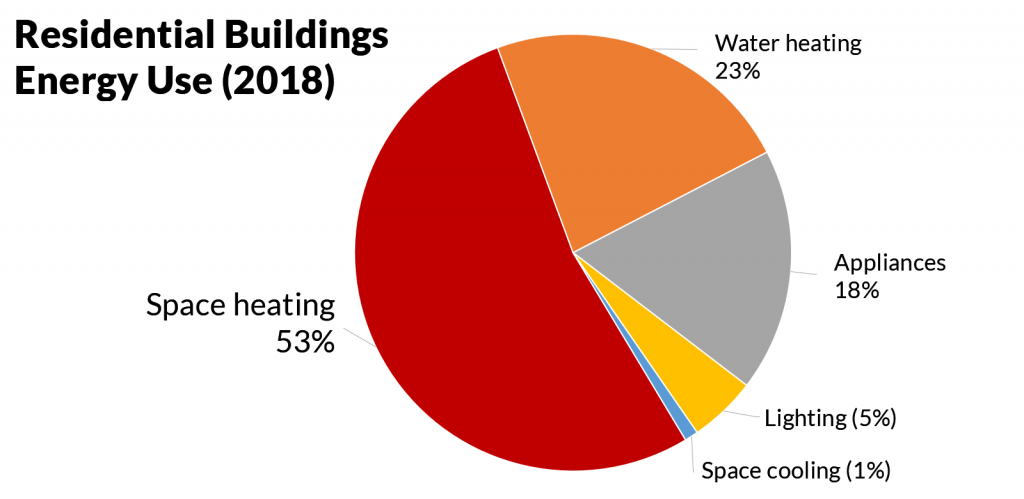Building Envelopes, Energy Efficiency and Funding Options
Residential buildings in BC are responsible for a significant share of the province’s overall greenhouse gas emissions – more than the equivalent of four megatons of carbon dioxide.
The design and performance of the building envelopes can have a considerable impact in reducing a building’s carbon footprint. As seen in Figure 1, space heating, cooling, and lighting account for 59% of energy use in residential buildings in BC, which is significant. Retrofitting the envelope and making maximum use of natural light can offer multiple benefits, which include improving the comfort of residents, reducing building contributions to climate change, and potentially lowering operating costs.

Figure 1, Breakdown of energy use in residential buildings in BC (2018); Source: Natural Resources Canada
Co-ops can take on bold actions in reducing the amount of energy used. Options include replacing old windows; improving wall insulation; replacing or sealing cracks in the cladding; and increasing insulation of attics, basements, or crawl spaces. (New construction projects offer even more opportunities. If you’re considering infill projects, you might want to look at passive house or net zero buildings.) Funding larger projects can be challenging, but co-ops have choices: saving through replacement reserve funds and borrowing money are the most reliable options, but government programs can also (sometimes) help. That assistance can focus on studies and planning or focus on construction itself. Having a long-term, asset management plan can really be a benefit, not least as part of a community conversation about co-op goals around physical spaces.
An energy audit by a professional can help identify energy conservation measures (ECM) to prioritize the interventions with the highest returns on investment, both from a greenhouse gas emissions reduction perspective and from a cost perspective. As suggested, co-ops can benefit from available government programs to obtain energy studies, and potential grants and rebates.
Programs targeting non-profit housing operators (co-ops and others)
CMHC, the Federation of Canadian Municipalities (FCM), and provincial utilities (BC Hydro and Fortis BC) offer eligible non-profit housing providers grants, low-interest loans, and rebates for investigative and feasibility studies. Sometimes they also offer help on implementing projects.
- CMHC’s Preservation Funding is open to co-ops with active or previous federally-administered operating agreements. It provides funding for studies, typically up to $50,000, so co-ops can better understand their buildings and finances. In advance of major construction, this funding can potentially be used to pay for studies like appraisals, hazardous materials surveys, environmental studies, and energy audits. Learn more here: https://www.cmhc-schl.gc.ca/en/developing-and-renovating/funding-opportunities/preservation-funding
- The National Housing Co-Investment Fund may offer funds to implement projects. CMHC has various requirements of co-ops regarding energy efficiency, affordability, and accessibility. Many co-ops may find the eligibility criteria difficult (or even impossible) to achieve, but the program can offer the possibility of loans at lower interest rates than private lenders and may even provide some grants. Requirements may also loosen as the program matures. Learn more here: https://www.cmhc-schl.gc.ca/en/nhs/co-investment-fund—housing-repair-and-renewal-stream
- The Green Municipal Fund for Sustainable Affordable Housing program offers grants to cover a portion of the eligible costs for housing providers who seek energy performance improvements of their buildings. This program offers funds through the lifecycle of an affordable housing construction project, and non-profit housing providers can choose the option that is most suitable for their needs. Grants under “Planning” and “Study” options can cover the costs for building condition assessments (BCAs), energy audits, environmental studies, accessibility, and appraisal costs. These funds are competitive and focused on energy performance of affordable housing sector. Learn more here: https://fcm.ca/en/programs/green-municipal-fund/sustainable-affordable-housing
- BC Hydro and Fortis BC also offer rebates on home renovation that includes rebates on doors and windows, and insulations. More information can be found here: https://www.bchydro.com/powersmart/residential/savings-and-rebates/current-rebates-buy-backs/home-renovation-rebates.html#upgrades
- Energy Conservation Assistance Program (ECAP) offers incentives for door weatherstripping; insulation in walls, attic, or crawl space; and a number of other items. Learn more about the program here: https://www.bchydro.com/powersmart/residential/savings-and-rebates/savings-based-on-income/free-product-install-and-advice.html or download our flyer.
Note: this is an older post. ECAP stopped accepting new applications in June 2024.
- Social Housing Retrofit Support Program also offers energy study funding (up to $5,000), implementation support funding (up to $7,000), and rebates on a variety of high-efficiency upgrades. To find out more about the program see: https://www.bchydro.com/powersmart/business/programs/shrsp.html
Programs targeting housing generally
There are other programs that are open to housing that are not specifically operated on a non-profit basis.
- Go Electric EV Charger Rebate Program
Rebate programs for purchasing an electric vehicle - Rebate Search Tool (Clean BC)
Search for rebate programs focused on heating system retrofits - FortisBC Rebates and Offers
Searchable database of rebate and incentive programs - City of Vancouver Heritage Grants
Programs to support heritage conservation and preserve heritage-designated buildings in Vancouver